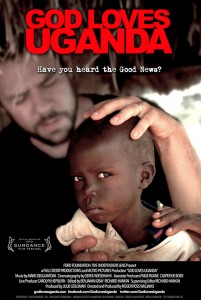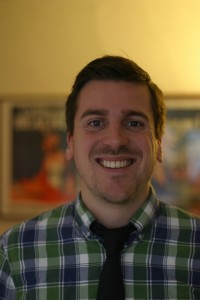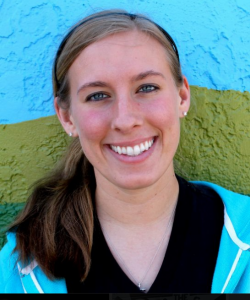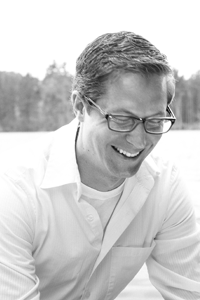
This post is written by Michael Kimpan, our Associate Director at The Marin Foundation.
—
I’m not crazy about baseball. I never have been.
Yet living in Chicago, just blocks away from Wrigley Field, means that I’m bound to become a Cubs fan. Working with Andrew at The Marin Foundation makes this transition all the more likely, as his support of the Cubbies borders on obsession.
In an effort to embrace my pending inevitable affection for America’s favorite pastime, I went with Andrew to an opening series game against the Milwaukee Brewers. We sat in the bleachers out in left center field, hoping to catch anything that screamed past the wall.
‘All you need to know is if you catch a home run hit by the Brewers, throw it back.’ a friend said. Easy enough.
I must admit the atmosphere was indeed incredible. Smells of hot dogs, nachos and beer filled the nighttime air. The roar of the crowd at each crack of the bat was reminiscent of something out of baseball films like ‘The Natural‘ or ‘Field of Dreams.’ Every play was analyzed by the faithful, desperate to snap a 104 year long championship drought.
Maybe this year.
Fans took turns yelling encouragement or mockery at the players during batting practice (depending on the color of their uniforms) and occasionally engaged in somewhat friendly banter with one another.
There was one particularly brave group of Brewers supporters a few rows behind us in our section – decked out with full Brewers swag – who received the brunt of criticism from the majority of fairly intoxicated Cubs fans in our section.
It all seemed to be done in good fun, until about the 3rd inning.
One of the Brewers bunch was a late teens/early twenties male who had clearly suffered from terrible acne for years. His face was scarred – almost assumedly from extensive laser treatments and declaring a dermatology war on his face. His lips were dry and chapped with the tell-tale sign of medication meant to decrease oil production in the body.
I know, because I also had horrible acne as an adolescent.
Yet this young man’s skin was worse than anything I’d ever seen. His face looked more like a burn victim – a fact not lost on even some of the more inebriated folks in our section. A verbal altercation proved this point at the bottom of the third.
‘The Brewers suck!’ one drunken frat boy decked out in Cubs gear declared.
‘You suck!‘ the facially-scarred Brewers fan responded.
‘Oh yeah? Well…well, you’re a PIZZA FACE!‘
Andrew and I winced. A woman behind us muttered, ‘That was low.‘ She was right.
This perspective was not shared by everyone, however. Several companions of the drunken frat boy joined in on the rhythmic chorus, as if on cue ::
‘PIZZA FACE! PIZZA FACE! PIZZA FACE!’
Laughing, pointing, mocking.
The fans from Milwaukee defended their friend, complete with bravado, foul language and empty threats. Any physical altercation would end badly for them, as they were initially outnumbered at least 20 to 1. This fact too was not missed by the drunken frat boy and his friends, as they reacted with even more vitriol – and encouraged the rest of the crowd to join in on their chant.
‘PIZZA FACE! PIZZA FACE! PIZZA FACE!’
More laughter. More pointing. More mocking.
Andrew and I sat in a silent state of shock, then began to process out loud with one another what role we could play in standing up for these Brewers fan while simultaneously avoiding escalating the situation.
‘If we invited him to come sit down here with us, they’ll start throwing things at him from behind us.’
‘If we turn around and yell at them to stop, it’s not going stop. It may only get worse.’
‘But we can’t just sit here and do nothing.’
The crowd behind us had multiplied in its verbal cacophony, which now included the entire section. Quite literally nearly all the left center field fans had joined in on the vocal assault of this young kid from Milwaukee, chanting and pointing and laughing and mocking.
‘PIZZA FACE! PIZZA FACE! PIZZA FACE!’
At one point ‘Pizza Face’ passionately pleaded with his oppressors. Through teary eyes he hollered, ‘I just want to watch a baseball game! You want to talk about the game? Watch the game. Stop calling me names – you’re being stupid. Let’s just talk about baseball.’
For a brief and holy moment, there was silence.
Then, one fan hollered, ‘Or…we could talk about…PIZZAAAAAAA!’ he wagged his tongue and shook his body for dramatic effect.
The fans went ballistic.
PIZZA FACE! PIZZA FACE! PIZZA FACE!
By now the increased intensity of the verbal onslaught on the out of town guests had caught the attention of a few Chicago Cubs security guards, who had come over – presumably to put an end to the inhospitable and entirely inappropriate chant. But what happened next showed instead of a desire for peace, a prejudice – the guard participated with the crowd in alienating these young Brewers fans.
He approached the friends around ‘Pizza Face’ and scolded, ‘You all stop instigating this, or we’ll have to kick you out.‘
I stood there flabbergasted. The security guard was threatening to kick these kids out? Protecting the oppressors? Standing up for the bully-ers rather than the bullied?
The crowd erupted in a frenzy ::
PIZZA FACE! PIZZA FACE! PIZZA FACE!
Some of the Cubs fans had bought pizza to use as visual props. They held up slices next to their heads, smearing pepperoni onto their faces in some sort of show of support for the weak-minded security guard.
HE’S A PIZZA FACE! A PIZZA FACE! A PIZZA FACE!’
It felt like a lynch mob.
I could hardly believe it. Neither could Andrew.
I put my head down and shook it…I didn’t know what to do, but it was clear something needed to be done. In those few short seconds, Andrew had already bolted from his seat and made his way over to the security guard.
‘I’ve never seen anything like this before,’ he declared. ‘This is ridiculous, your security is ridiculous, and you need to make this stop. The poor kid can’t help the fact that he has acne.’
‘He brought it on himself,’ the security guard half-heartedly explained, defending his friends donning Cub apparel. ‘He’s wearing a Brewer’s jersey in the bleachers at Wrigley.’
‘This isn’t about baseball!’ Andrew exclaimed. ‘They’re making fun of him for something he has no control over and attacking him as a person! This is wrong!‘
The kid was crying. The crowd was screaming. I made my way past the few seats between Andrew and I.
No sooner had I arrived at Andrew’s side when the man in front of our conversation with the security guard spun around, pointing his finger within inches of Andrew’s nose. ‘You’re the pizza face!‘ The crowd grew louder.
PIZZA FACE! PIZZA FACE! PIZZA FACE!
It was clear that Andrew’s newfound antagonist had been boozing as his breath was laden with both bratwurst and beer. He and his friend were enjoying playing the part of the oppressor, as it was likely not their modus operandi in high school. The frail frames and bottle-cap-thick glasses suggested they had been on the receiving side of harsh words before, and this was their chance to be the bully. Armed with liquid courage, he threatened to use force to remove Andrew – not the smartest move he’d ever made.
Both of us screamed at the guy to turn around and watch the game. Andrew added, ‘I’m not even freaking talking to you, so you shut your mouth!‘ Things were heating up fast.
PIZZA FACE! PIZZA FACE! PIZZA FACE!
Andrew and I both took verbal abuse from the crowd as we left the section to talk with the Chicago Cubs security team. Several security guards and their supervisor came discussed with us the reality of the dangerous situation, which was quickly spiraling out of control.
Our complaint against the mob mentality of the crowd, their inappropriate and offensive treatment of the Brewers fan and the ineffectiveness of the first security guard to protect them was initially met with resistance. ‘They shouldn’t be sitting in the bleachers anyway – not if they’re wearing Brewers jerseys.’
Andrew about lost his salvation.
‘ARE YOU KIDDING ME RIGHT NOW?!?!’ We went on to explain the complaint had nothing to do with baseball, but that the crowd was personally attacking this poor kid for what he looked like. ‘This is something he can’t control – his physical appearance. How would you feel if someone was attacking you for what you look like?’
One security guard was severely overweight.
Another was an African American.
‘They couldn’t make fun of us – there’s nothing to make fun of.’
It was as if we were in the Twilight Zone. We carefully explored the possibility of their physical appearance – the color of their skin or the size of their waistline – being used as a catalyst for a verbal assault.
Finally one of the guards ‘got it.”Yeah, I guess that would be offensive.’
No sooner had the light gone off in his head than over a dozen Cubs fans had made their way to the top of the stairs where our pow-wow with the security team was taking place. ‘Thanks for finally standing up for that kid,‘ one said. ‘I’m embarrassed to be a Cubs fan today,‘ said another. ‘I really appreciate what you said – it is ridiculous, and it needs to stop.‘ ‘These guys are right.’
And on. And on.
The guards encouraged Andrew and I to sit in a different section, hoping to diffuse the increased intensity with which we had made our exit. I asked if I could retrieve our belongings, and did so. As I made my way down to our seats, several fans thanked me, stating they were all hoping someone would say something.
They all wanted to. But none of them had. Not until Andrew did.
We settled into our seats across the field and watched as one by one the instigators were escorted out by security. Initially some of the crowd still joined the juvenile chants about the Brewers fan’s appearance, but with the lack of buy-in from the rest of the fans, they eventually settled down.
As we sat there in amazement at the preceding events, Andrew and I chuckled at our seeming ability to instigate near riots in everyday situations. We just wanted to go to a Cubs game! How did we get ourselves into these kinds of situations?
‘It’s because we insert ourselves,’ Andrew said. ‘For us, this isn’t just something we talk about. It’s something we live every day. People are waiting for someone to speak up – they’re just afraid to be the first one.‘
And having inserted ourselves, we saw the power of the voice of ‘the first.’ When the first person refuses to sit in silence, but instead calls out oppression for what it is, being willing to stand in solidarity with those being pushed to the margins and mistreated, others follow suit. Courage is contagious, and boldness is infectious.
The question each of us face is whether or not we possess the conviction to be willing to risk our reputations and even our physical safety in an effort to stand in solidarity with those being marginalized and oppressed (one well-known example of Jesus doing that is found here).
Are we willing to be the first? On that day, we were – and at least for one Brewers fan, it made a difference. Though he heard the insufferable statements lobbed in his direction from a group of immature and insolent sports fans, he also saw that there are people who are willing to take a stand against the masses and be the first – even for a Brewers fan.
Oh – and the Cubs won.
Maybe this year indeed.
—
Connect with Michael through his thought provoking blog, hit him up on Facebook, or follow him on Twitter.
 Michael KimpanMichael Kimpan serves as our Associate Director. He has a BA in Youth Ministry and Biblical Theology from Moody Bible Institute in Chicago, IL and is currently working on his Masters of Arts in Theology and Ministry from Fuller Theological Seminary. You can check out his blog, The WayWard Follower at www.mjkimpan.comRegister soon at the link above to guarantee your spot! Or if you have any questions or concerns, please contact Jason: jason@
Michael KimpanMichael Kimpan serves as our Associate Director. He has a BA in Youth Ministry and Biblical Theology from Moody Bible Institute in Chicago, IL and is currently working on his Masters of Arts in Theology and Ministry from Fuller Theological Seminary. You can check out his blog, The WayWard Follower at www.mjkimpan.comRegister soon at the link above to guarantee your spot! Or if you have any questions or concerns, please contact Jason: jason@

























